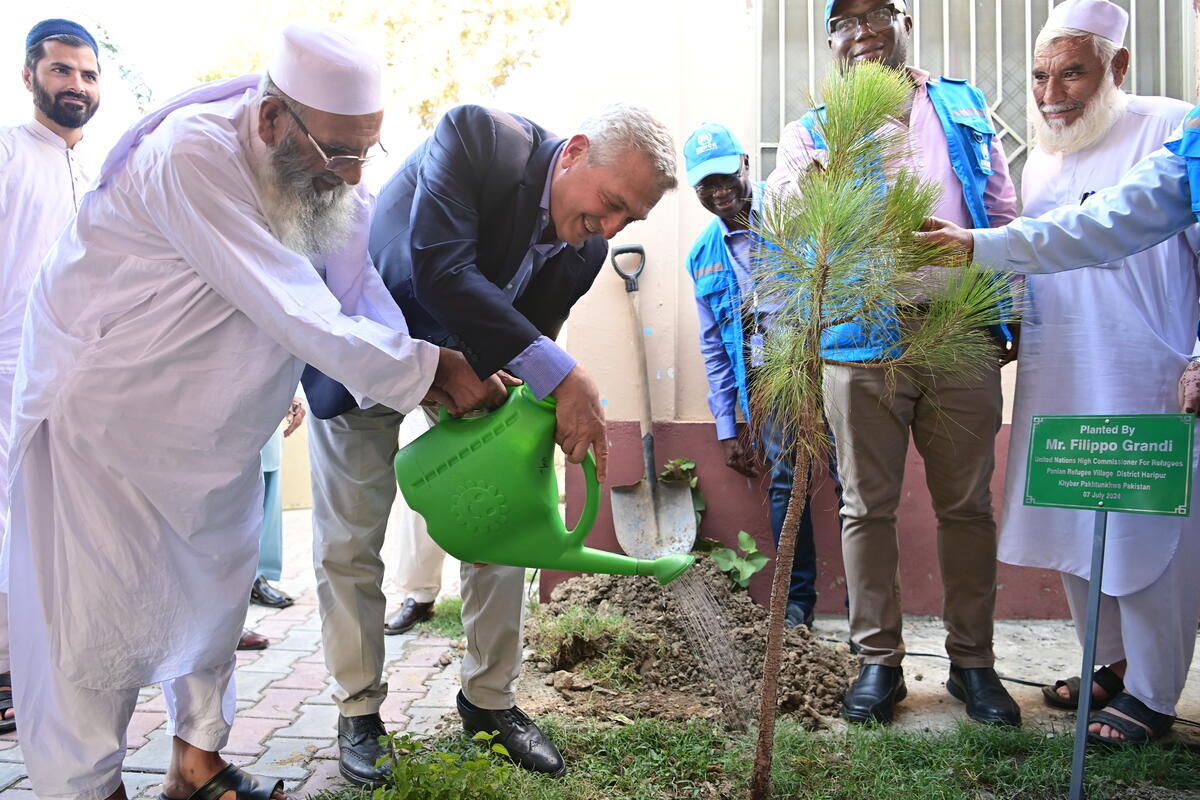Afghan returnees hope for sweet returns from buzzing business
Afghan returnees hope for sweet returns from buzzing business

BEHSUD, Afghanistan, September 5 (UNHCR) - If there's one area in Afghanistan's patriarchal society where females are valued highly, it is beekeeping. That seems apt considering that the female bee dominates the hive - a fact which may have surprised some 30 male students listening intently to a recent lecture by agronomist Abdullah Ahad Qarashi in this eastern district.
"Male bees are only good for producing the next generation. We need more female bees, especially queen bees, because they do all the work," explained Qarashi, whose audience ranged from children to old men. The class members were among 150 Afghans - 90 men and 60 women - who are learning about beekeeping after returning from Pakistan to Behsud in Nangarhar province.
The six-month course by the Society for Afghan Development and Assistance Technology is one of the income-generating activities funded by the UN refugee agency to help returnees settle back in their place of origin after years in exile.
Lectures are held in an orange grove, with morning sessions reserved for female students and the afternoons for males. Even under the strict Taliban regime, beekeeping was one of the few jobs deemed acceptable for women because it could be practised in a home compound.
The honey business has a long tradition in Afghanistan, with the first honey bees thought to originate in the region. Since the late 1970s, wars and droughts have depleted the flowers that bees need to produce honey.
But today, there is hope for beekeepers in Nangarhar province. Fed by the resurgent Kabul River, the area's lush vegetation provides abundant forage for bees, while equipment is easily made locally. "We're using new techniques, and trying to educate people on the importance of bees in pollination," said instructor Qarashi, who studied agriculture in the Afghan capital of Kabul.
The first half of his class focused on theory. "First we need to know which flowers have nectar that is good for producing honey, so the bees that are attracted to these flowers are good bees," he said, adding that orange trees were ideal in the right season. "In the hot season, there are fewer flowers, so honey production drops."
The second half of the lesson involved practice. A beekeeper dressed in a hat and veil approached the hive - a wooden box containing one queen bee and many workers. The worker removed a frame from the box after spraying it with water, which he said made "the bees think it's raining so they stay inside the box." He then gently brushed off the few straying bees.
Encrusted with concentrated honey and pollen, the frame is slotted into a centrifuge that spins and extracts liquid honey, which is then filtered. Under ideal circumstances, each hive produces 20-30 kilogrammes of honey per year selling for US$2.50 per kilo.
"The course is very useful," said returnee Ghulam Nabi. "But you need courage in this job to survive the stings. One or two stings don't make a difference."
When the lessons end in December, the beehives will be distributed to the returnees so that they can continue the project. "Beekeeping is now our profession. We'll start from one box and keep growing more," said Nabi, adding that they would pool their resources and share the income.
A similar honey-making project is being held in neighbouring Laghman province, where returnees have started to harvest and sell their produce.
In addition to beekeeping, other income-generating projects funded by UNHCR in Afghanistan include fish farming, sewing and pasta-making for returnee women, as well as broom making and basket-weaving for blind returnees. All projects are community-based and benefit other residents in areas of return.
Livelihood is one of the main concerns of Afghans still in exile. In a 2005 census of Afghans in Pakistan, 18 percent of the 3 million counted said they were not ready to repatriate because of a lack of job opportunities in Afghanistan.
"These activities benefit a given community, but they are a mere drop in the ocean considering the enormous livelihood problems of returnees," concedes UNHCR's representative in Afghanistan, Jacques Mouchet. "However useful our projects are, much more needs to be done for reintegration as part of the longer-term reconstruction and development of Afghanistan, with the support of the international community."
More than 4.6 million Afghans have returned home since UNHCR started assisting repatriation in 2002, mostly from neighbouring Pakistan and Iran.
By Vivian Tan in Behsud, Afghanistan









